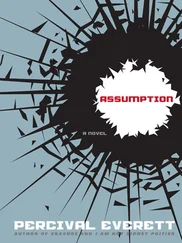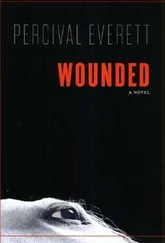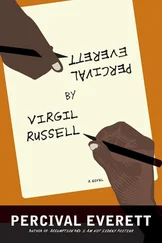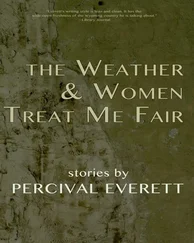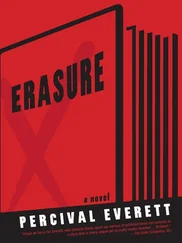“Prof.”
“Well, ain’t this just sweet and friendly,” the Chief said. “This is a damn jail. Everybody out of here.”
Everett reached through the bars and shook hands with Billy. “Take care of yourself, you pathetic peckerwood motherfucker.”
“You, too, you darkie sumbitch.”
Everett smiled at me. “It’s a special thing when you do time with a fellow.” He led the way back into the main room of the station. “So, tell me how I killed you, and why it didn’t stick,” he said.
I ignored Everett’s question and told him what I’d told Ted, that someone wanted to kill me. I then told him why.
“That was stupid,” he said. “That’s one of the stupidest things I’ve ever heard.” He looked over at Ted. “I hate colorization.” He then turned to the Chief. “I’m not speaking metaphorically.”
“I have mixed feelings about it myself,” Ted said. “Don’t you just hate when you’re watching a movie, and you can’t remember if it’s the first version or a remake. You know, like Heaven Can Wait. ”
“No, I kind of like that feeling.” Everett turned and looked me up and down. “What’s with the monkey suit?”
Ted looked at his thumb. “What do you call it when you get that painful bit of nail on the side of your cuticle and you can’t help but push up and make it hurt more and you never have a clipper with you?”
“I never knew what that was exactly. Is that what I’m supposed to call a hangnail?” Everett asked.
“I guess that’s what you call it,” Ted said.
“You’re right, though. It is really annoying,” Everett said. “I always get them right before I’m about to have sex for some reason.”
“Would you two shut up?” I said.
The Chief and Horace looked on as if they had been invaded by Russian-speaking madmen. The big-haired dispatcher dozed in her chair. The rain had started up outside again, and the wind howled.
“I say we go get your money and put it in the bank,” Ted said.
“I agree,” Everett said. “That doesn’t mean it’s the right or smartest thing to do, but I agree with it.”
It was the thing to do. And as long as I kept the Chief with me, I figured I was relatively safe. Even though the rain was falling more heavily than ever, I felt an urgency about getting the money. I looked out the window and at the black sky.
“Listen, I want everybody out of this goddamn station right now,” the Chief barked.
The dispatcher sat up and said, “Weather Service just announced a tornado watch for all of Bullock County.”
Horace whistled. “It does look bad out there.”
“What’s the difference between a tornado watch and a tornado warning?” Ted asked. “I mean, which one is worse?”
“I think a warning means somebody’s seen one,” Everett said.
“But how can you watch something that’s not there?” Ted asked.
Everett scratched his head.
Ted looked at Everett’s face. “Percival Everett. Didn’t you write a book called Erasure ?”
Everett nodded.
“I didn’t like it,” Ted said.
“Nor I,” Everett said. “I didn’t like writing it, and I didn’t like it when I was done with it.”
“Well, actually, I loved the novel in the novel. I thought that story was real gripping. You know, true to life.”
“I’ve heard that.”
It grew darker outside. The wind screamed. The dispatcher calmly crawled under her desk. The front door blew open, hit the wall, and then slammed shut. Horace was shaking.
“Wow,” Everett said. “I’ve always wanted to see a tornado, if in fact this is one. Could be just a bad storm.”
“I read that tornado is a messed-up form of some Spanish word, tronada or something like that.”
Everett scratched his head. “Could be from the Latin tonare, to thunder. Anyway, I like the word twister better.”
“Maybe you two should step outside there and get a close-up look,” the Chief said.
“Maybe I will,” Everett said. He smiled at the Chief. “Tell me, constable, just what is a Smuteye?”
“It’s a dish,” I said.
“I tried it,” Ted said. “Tastes like shit.”
Everett looked at the Chief and around the station. “I can well imagine.”
The whole building rattled.
“Well, we can’t go out in this mess,” the Chief said. “The best we can do is hunker down in here. And the best place for that is back in the cells.” He leaned over the dispatcher’s desk. “You’re gonna have to come on back, Lucy.”
So we did. Horace unlocked the cell doors and we all joined Billy sitting on bunks and against the walls.
Everett stared at the disgusting, seatless toilet. “I grew to hate that during my incarceration,” he said.
The roof shook, and we all looked up. Dust fell from the ceiling into our eyes. The wind roared like an engine.
“It’s a bad one,” Horace said.
“Thanks for the news,” the Chief said.
I pictured the satchel of money swirling up into the funnel cloud, opening and scattering the bills across six counties and into Georgia. I felt nothing for the money; it was only fifty thousand, a drop in my so-called bucket. However, I felt I needed it in order to make a show of depositing it into the bank — a move designed to protect myself from the would-be robbers. And I wanted the sisters to have it, though I was unsure why that was important to me, if in fact it was and not some mere and strange act of perversion on my part.
Ted was marveling at the storm and saying wow over and over. “I read that twisters in the northern hemisphere rotate counterclockwise, I think, opposite from the ones in the southern hemisphere. Hey, you ever try on trousers and they’re too short in the rise and for some reason you buy them anyway?”
“That happens to me a lot,” Everett said. “I don’t know why. Mr. Poitier was one of my favorite students. That is until he cowardly dropped out of school. I think it’s because no girls would sleep with him.”
The roof made a loud cracking noise, and we let out a collective gasp, but the structure stayed together. The dispatcher prayed loudly. Billy comforted her, called her “Mama.”
Horace said, “Think we’re going to die, Chief?”
“We’d never be so lucky,” the Chief said. “If I could only get that fucking lucky.”
Then the wind stopped. Rain leaked in through the damaged roof, but the blowing stopped. All was silent. “I guess that’s it,” the Chief said, disgust in his voice. He walked away back into the station room.
I followed him. “Chief, I think we ought to go get that money now the weather has broken.”
“Oh, you do,” he said. “That’s just like one of you selfish muckety-mucks from the city. I’ve got to go out there and check on the folks. I might have to rescue some poor peckerwoods from the tops of trees or some such. And all you can think about is your money.”
“Actually, it’s the sisters’ money,” I said.
“You and your friends go and find your damn money. I got pressing business to attend to.”
“But I’m afraid I’ll be in danger,” I said, slowly.
He looked blankly at me, then said, “Horace, drive around and see what’s what while I help this boy find his money. And do it right now and don’t go visiting that Sarah Purdy that you think I don’t know you visit every day.”
“Yes, sir, Chief.”

The road outside was strewn with fallen limbs and whatever garbage there was in the town of Smuteye, but it didn’t appear that any of the buildings had been ripped from their foundations. Ted and Everett sat in the back of the car while I sat in the front and reminded the Chief how to get to the sisters’ place. We turned off the road and bounced over a few limbs. Then I saw her. Actually, I first saw the white head of Thornton Scrunchy, then I saw Sister Irenaeus. I told the Chief to stop, and we got out. Sister Irenaeus and the man were shoving bills back into what I recognized as my satchel. When they saw us, they ran through the woods toward a pickup parked at the side of the road. Sister Irenaeus looked back when she reached the passenger-side door. She looked wild eyed, nothing like the woman I had met before. She turned, got into the cab, and slammed the door. Thornton Scrunchy punched the accelerator and sprayed the bushes behind him with mud and gravel. The truck sped away into the wet, windy, dismal gray of Bullock County.
Читать дальше


